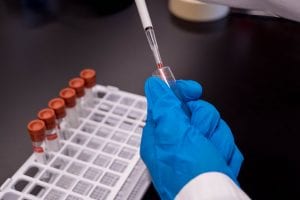Scientists say DNA can possibly be modified to prevent and halt cancer in its tracks.
Researchers at the University of Pennsylvania are working on modifying genetic code to prevent cancer in humans. They recently took patients’ white blood cells, removed negative genes patterns, then inserted a virus that would target a protein found on cancer cells. This means, for the first time in history, physicians are testing a gene-editing technique in people with cancer. This was done by using a tool known as Crispr.
The test was a pilot for monitoring the safety of doing so on a broader level help a patient’s own immune system to attack cancer. So far, results suggested that the procedure is safe, but it is still unclear whether it will act as a safeguard against cancer in the long run. Only three patients have been treated in the sample and a follow up will be conducted in nine months. All three are in their 60s with advanced cancers that’ve progressed despite standard treatments.
“The good news is that all of them are alive,” said Dr. Edward A. Stadtmauer, the section chief of hematologic malignancies at the University of Pennsylvania Abramson Cancer Center. He added, “The best response we’ve seen so far is stabilization of their disease.”
The research was paid for by the Parker Institute for Cancer Immunotherapy and the company Tmunity. The findings at set to be presented to the American Society of Hematology.

“This is really just the beginning of whole next generation of treatments,” Dr. Stadtmauer said.
More specifically, if the procedure is successful, researchers will pilot its success with a wide array of genetic diseases. It has already been used to treat sickle-cell anemia, and in other areas of the world, Crispr is being utilized to fight cancer. Doctors in China say they’ve used it for some time.
Two patients in the U.S. study have a blood cancer, multiple myeloma, and the third has a sarcoma. Physicians removed T-cells, the soldiers of the immune system, from the patients’ blood, and used Crispr to delete three genes. Next, they implanted a virus to direct the cells to attack a target called NY-ESO-1, a protein found on cancer cells.
“Once we infused these cells, there was anywhere from a 10,000-fold to 100,000-fold increase in the amount of cells growing in the patients, which is exactly what we hoped for,” Stadtmauer said, adding, “It’s good to have these cells hanging around doing serial surveillance for tumor. We’re happy that up to nine months later we’re still seeing the cells.”
As more patients are included, researchers say they will have a better sense of whether it is working. “It really just opens up a whole world of this type of manipulation of cells to be directed to whatever the imagination can think of,” Stadtmauer said. He added that the study builds about University of Pennsylvania’s Dr. Carl June, who was also part of the Crispr research. The earlier work developed CAR-T cells, which wiped out leukemia in a critically ill child. Stadtmauer felt this was “amazing,” but the study had limitations that the new Crispr work is working to bypass.
He explained, “Even in the best-case scenario with leukemia, 80 percent respond, and two thirds of those are doing well. With lymphoma, half respond, and half of those do well. So, there is still more to be done to improve this approach.”
Sources:
Crispr Takes Its First Steps in Editing Genes to Fight Cancer
Doctors Are Trying to Use CRISPR to Fight Cancer. The 1st Trial Suggests It’s Safe.


Join the conversation!